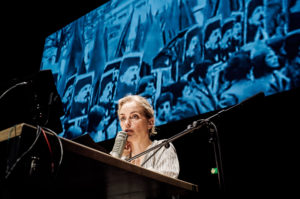
RETURNING TO REIMS, based on the memoir of Didier Eribon, directed by Thomas Ostermeier, featuring Nina Hoss
WAKE UP AND SMELL THE COFFEE
A THINK TWICE DRAMA VIEW
As remarkable as RETURNING TO REIMS is for what it does, it is even more surprising for what it doesn’t.
RETURNING TO REIMS doesn’t entertain or pander to the consumer in us as commercial theatre does . . . Rather, it awakens our interest in our own lives.
It doesn’t attempt to transform its audience into a gratified mob satisfied that theatrical justice has been exacted . . . It appeals to each of us as individuals capable of taking actions beyond the stage that are divergent, positive, and necessary.
It doesn’t rely on standard plot progression and escalating conflict to hold our interest and to arrive at a payoff . . . It values discussion and agreement over conflict and story closure.
It doesn’t fall into a reassuring pattern of satire and vitriol against the present . . . It doesn’t vent at easy targets. It addresses the current state of global politics through reminding us of the recent past.
Based on the memoir of Didier Eribon, about half of REIMS involves an actress Katy (played by Nina Hoss) reading from the memoir into a microphone. Her quietly hypnotic voice is being recorded in a studio as voice-over narration for a film based on the Eribon memoir. Behind her on a screen are cinematic images of the author returning to his childhood home on a train, a visit with his mother, and other images of the conservative working class neighborhood in Reims, France where Eribon grew up as a gay intellectual.
RETURNING TO REIMS achieves its intrigue and effectiveness as a theatrical thought piece by defying expectations. With a structure that is gracefully multi-layered, the audience is invited to not only witness but to enter into the thought process of film editing. What deserves to stay and what doesn’t?
The play that surrounds the film begins as an actress’s journey within a recording studio. Nina Hoss as Katy is already familiar to many for her role as intelligence agent Astrid in the cable series Homeland. Along with Katy, we experience an eerie silence, her seeming aloneness in the studio, and then only the sucking sound of a drip coffee maker. When I heard this, I didn’t realize the sound was coming from the stage and thought it was a fellow patron sucking too loudly through a straw—the effect was of a strangely familiar sound that lowered the fourth wall.
Then a voice from out of nowhere. “This is the ghost of your father.”
Alas, it’s not, though in a sense a ghost will show up. The voice is that of the film director Paul (Bush Moukarzel) coming through the studio sound system. His idea of a practical joke hints at what could become office bullying, and we feel grounded immediately into something more realistic than a ghost story.
What was exciting to me about RETURNING TO REIMS was not the film (directed by Sebastien Dupouey and Thomas Ostermeier) based on the memoir. It is the Lehrstück or Learning Play in the style of Bertolt Brecht that surrounds the making of the film. How Katy, Paul, and Toni (the studio manager, played by Ali Gadema) begin to interact as adults rather than children playing cruel games.
A Lehrstück makes observers of the audience and one of the things we observe is how quickly a class structure forms within this group of three (actress, director, studio manager). As casually as having a cup of coffee, Paul and Toni go out for gourmet coffee and leave the cheap office brew for Katy. They further the insult of not including her in their coffee foraging, by pretending the studio coffee is the good stuff they’ve saved just for her.
Wake up and smell the coffee, we are reminded symbolically.
Interestingly, this earnest profound work is what came of Nina Hoss’s reaction to the recent U. S. presidential election. She’d been following the campaign while shooting the sixth season of Homeland. After the election of Donald Trump, she decided that she wasn’t political enough.
Soon she and German director Thomas Ostermeier put their heads together and the result, RETURNING TO REIMS, premiered in Manchester, England, last July, before moving to Berlin. Ostermeier and Hoss have worked together before in a revival of Lillian Hellman’s The Little Foxes and Yasmina Reza’s comedy Bella Figura.
The film-studio Lehrstück and the film’s depiction of Didier Eribon’s memoir merge seamlessly. RETURNING TO REIMS concludes with Nina Hoss’s testimonial based on the life of her father, Willi Hoss. His inspirational and instructive bio is the culminating wake-up call for thinking individuals.
REIMS quietly and confidently implores us: Wake up from this collective childish malaise of escapist entertainment and our underlying sense of futility. We have the time and the will to make a difference one at a time, as citizens of the world.
RETURNING TO REIMS is playing now at St. Ann’s Warehouse until February 25)

Leave a Reply